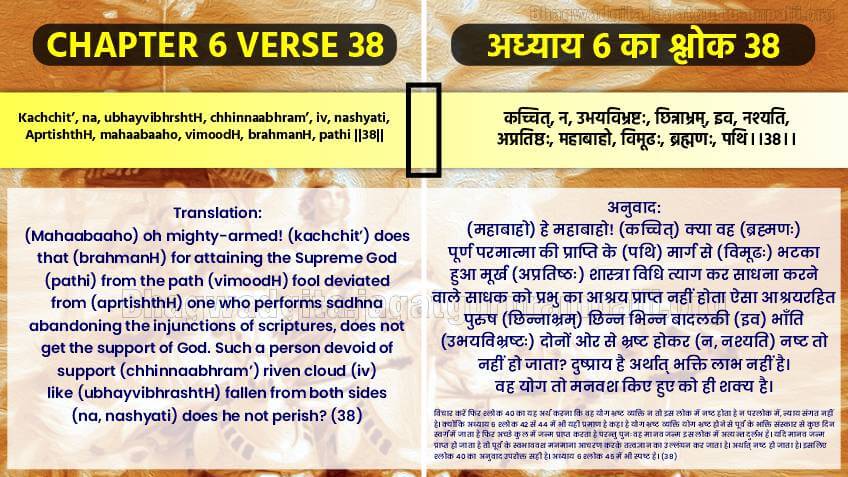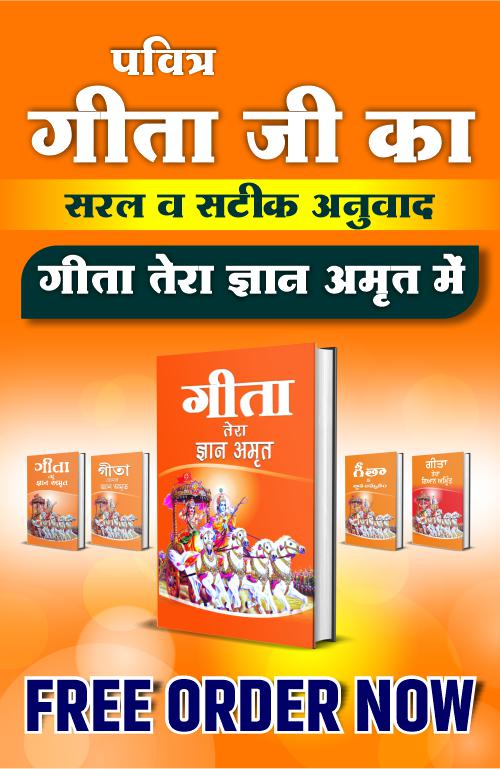
Kachchit’, na, ubhayvibhrshtH, chhinnaabhram’, iv, nashyati,
AprtishthH, mahaabaaho, vimoodH, brahmanH, pathi ||38||
Translation: (Mahaabaaho) o mighty-armed! (kachchit’) does that (brahmanH) for attaining the Supreme God (pathi) from the path (vimoodH) fool deviated from (aprtishthH) one who performs sadhna abandoning the injunctions of scriptures, does not get the support of God. Such a person devoid of support (chhinnaabhram’) riven cloud (iv) like (ubhayvibhrashtH) fallen from both sides (na, nashyati) does he not perish? (38)
Translation
O mighty-armed! Does that fool deviated from the path for attaining the Supreme God; one who performs sadhna abandoning the injunctions of the scriptures does not get the support of God; such a person, devoid of support, fallen from both sides, not perish like a riven cloud?
It is dushpraapya (scarcely attainable) i.e. there is no benefit of bhakti. This yog is possible for only he who overpowers mind. Please contemplate then that is it justified to do the meaning of Shlok 40 as neither does that person deviated from yog get destroyed in this world, nor in the other world. Because in Adhyay 6 Shlok 42 to 44 also there is this same evidence. It has been stated that a person deviated from yog due to the sanskaar prior to getting deviated goes to Heaven for some days, then takes birth in a virtuous family, but that human birth is very rare in this world/lok. If he attains human birth then out of previous nature by behaving arbitrarily violates the Tatvgyan i.e. gets destroyed. Therefore the above-mentioned translation of Shlok 40 is correct. It is also clear in Adhyay 6 Shlok 45.
कच्चित्, न, उभयविभ्रष्टः, छिन्नाभ्रम्, इव, नश्यति,
अप्रतिष्ठः, महाबाहो, विमूढः, ब्रह्मणः, पथि।।38।।
अनुवाद: (महाबाहो) हे महाबाहो! (कच्चित्) क्या वह (ब्रह्मणः) पूर्ण परमात्मा की प्राप्ति के (पथि) मार्ग से (विमूढः) भटका हुआ मूर्ख (अप्रतिष्ठः) शास्त्रा विधि त्याग कर साधना करने वाले साधक को प्रभु का आश्रय प्राप्त नहीं होता ऐसा आश्रयरहित पुरुष (छिन्नाभ्रम्) छिन्न भिन्न बादलकी (इव) भाँति (उभयविभ्रष्टः) दोनों ओरसे भ्रष्ट होकर (न, नश्यति) नष्ट तो नहीं हो जाता? दुष्प्राय है अर्थात् भक्ति लाभ नहीं है। वह योग तो मनवश किए हुए को ही शक्य है। विचार करें फिर श्लोक 40 का यह अर्थ करना कि वह योग भ्रष्ट व्यक्ति न तो इस लोक में नष्ट होता है न परलोक में, न्याय संगत नहीं है। क्योंकि अध्याय 6 श्लोक 42 से 44 में भी यही प्रमाण है कहा है योग भ्रष्ट व्यक्ति योग भ्रष्ट होने से पूर्व के भक्ति संस्कार से कुछ दिन स्वर्ग में जाता है फिर अच्छे कुल में जन्म प्राप्त करता है परन्तु पुनः वह मानव जन्म इस लोक में अत्यन्त दुर्लभ है। यदि मानव जन्म प्राप्त हो जाता है तो पूर्व के स्वभाववश मनमाना आचरण करके तत्वज्ञान का उल्लंघन कर जाता है। अर्थात् नष्ट हो जाता है। इसलिए श्लोक 40 का अनुवाद उपरोक्त सही है। अध्याय 6 श्लोक 45 में भी स्पष्ट है। (38)
